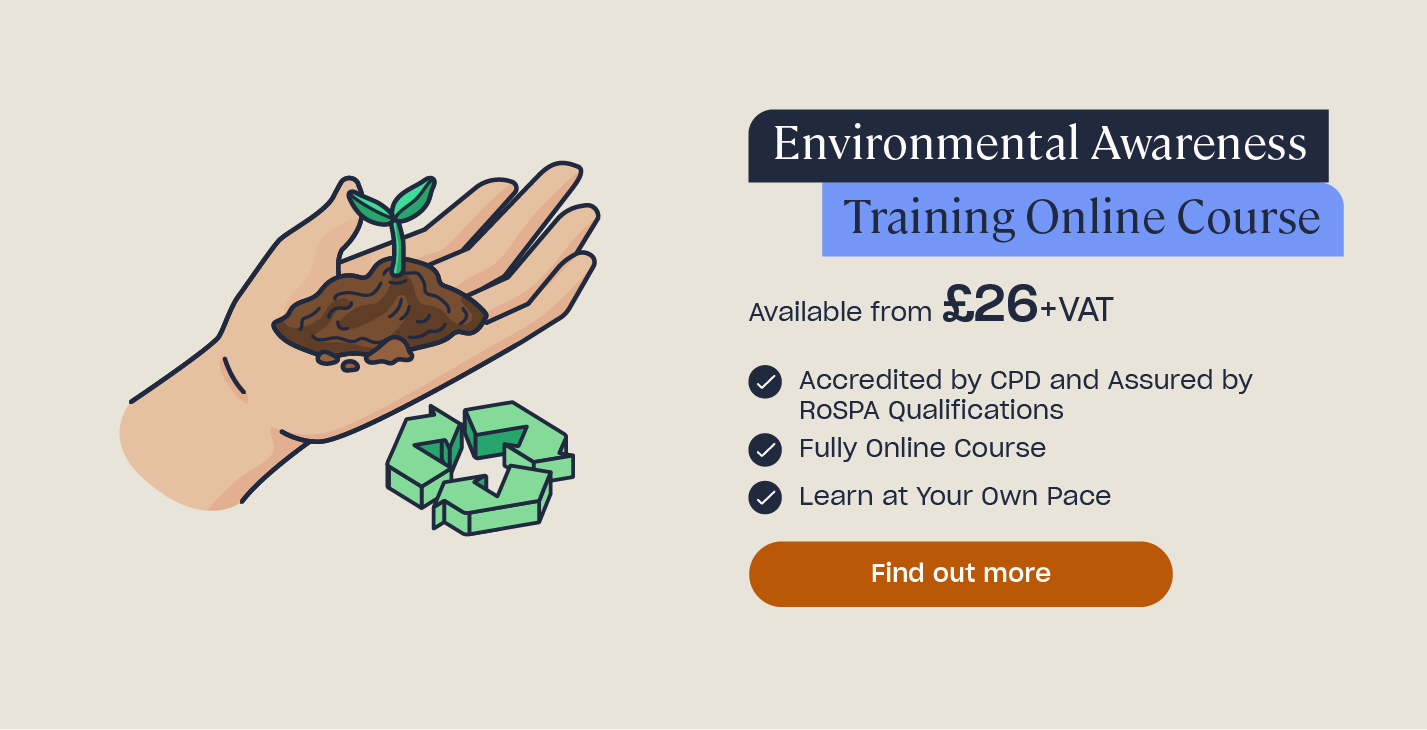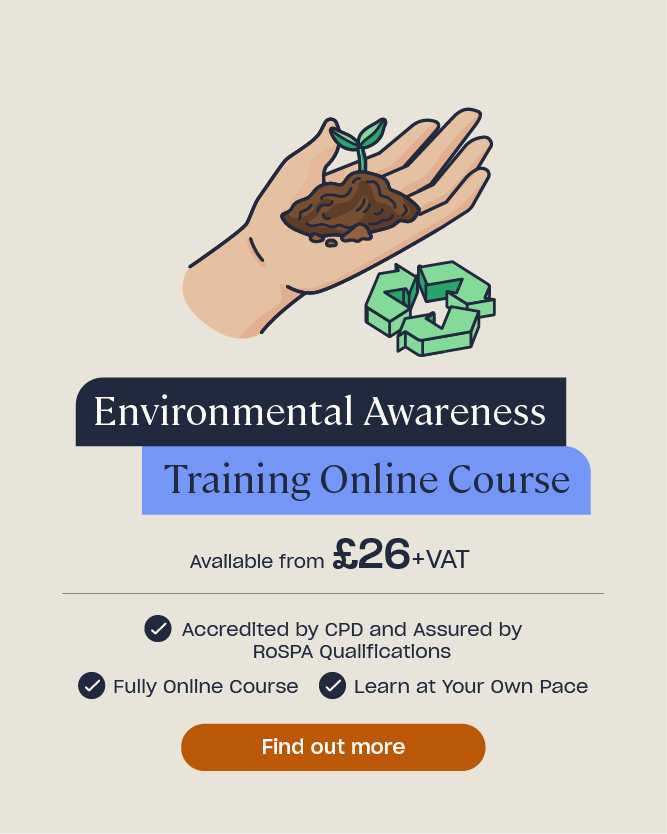What You Need to Know About Food Waste Separation
As climate change continues to impact our day-to-day lives, causing an increasing number of international incidents, finding ways to live and work sustainably is more important than ever. The significance of environmental awareness cannot be understated and it is only through understanding our impact on the environment that we can start to protect and improve it. A significant contributor to climate change is food waste and around 9.5 million tonnes of food is wasted each year in the UK. To help combat the detrimental impact of food waste, the government introduced the Environment Act 2021 which, amongst other things, seeks to tackle waste, increase recycling and improve our natural environment.
Section 57 of the act, which will come into force on 31st March 2025, seeks to support the government’s aim to eliminate all avoidable food waste ending up in landfills by 2030. Under the act, it is mandatory for all non-domestic properties that produce any food waste to arrange separate collection by licensed waste carriers. The act applies to all businesses and public and third-sector organisations such as, but not limited to; restaurants, pubs, hospitals, prisons, care homes and schools etc. Businesses with fewer than 10 full-time employees, also known as micro-businesses, will not have to comply with the new legislation till 31st March 2027.
In this article we will explain what waste separation is and what the new regulations are under the Environment Act 2021. This article will help you to understand your responsibilities and provide you with a range of free downloadable posters to act as a reminder of the new legislation and encourage the proper separation of waste.
What is Waste Separation?
Waste separation refers to the sorting and separating of waste into different elements in order to facilitate recycling and appropriate disposal. There is no legal or universally accepted definition of ‘food waste,’ however the Separation of Waste (England) Regulations 2024 defines food waste as ‘biodegradable material resulting from the processing or preparation of food and drink including inedible food parts such as bones, eggshells, fruit and vegetable skins, tea bags and coffee grounds.’
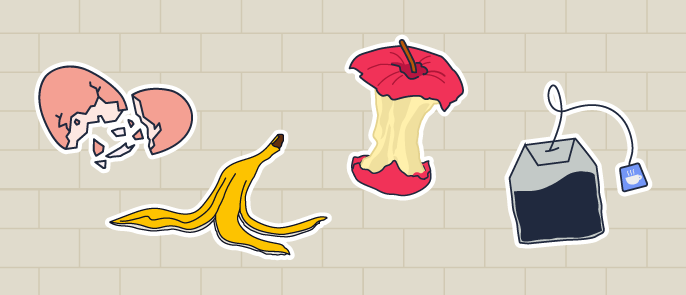
Whilst the new legislation makes waste separation mandatory for non-domestic properties, it is something that most people have been doing in their households for years. In 2003 the government introduced the Household Waste Recycling Act which meant that every local authority had to provide households with separate recycling collection. The introduction of recycling wheelie bins saw waste separation become the norm for most households. The new act brings this same level of responsibility to businesses, seeking to reduce the environmental impact of the waste that they generate, whilst highlighting the importance of corporate social responsibility.
Food Waste Legislation
From 31st March 2025 (or 31st March 2027 for micro-businesses) all businesses and non-domestic premises will have to comply with new food waste separation legislation. Under the Environment Act 2021 businesses that produce food waste must:
- Separate all food waste from other waste streams.
- Store food waste in separate bins from other waste.
- Arrange for the collection of food waste by licensed waste carriers.
Note: Whilst under Welsh waste laws, only businesses and non-domestic premises that produce more than 5kg of food waste per week must separate their waste, as yet DEFRA have set no such minimum for England and have stated ‘there is no minimum food waste weight before the new regulations apply.’
The Environment Act 2021
The Environment Act 2021 will support the government’s aim to eliminate all avoidable waste being sent to landfills by 2030. The act includes a number of policies that seek to improve air and water quality, biodiversity, resource efficiency and reduce waste. When first published, Environment Secretary at the time, George Eustice, stated that the act ‘will deliver the most ambitious environmental programme of any country on earth […] setting an example for the rest of the world to follow.’
The Environment Act 2021 has two main functions; to provide a legal framework for environmental governance in the UK and to introduce measures for the improvement of the environment. It also reflects a growing expectation that businesses operate more sustainably with better accountability and transparency. As such, the general public and other parties will be able to report workplaces that do not follow the new legislation.
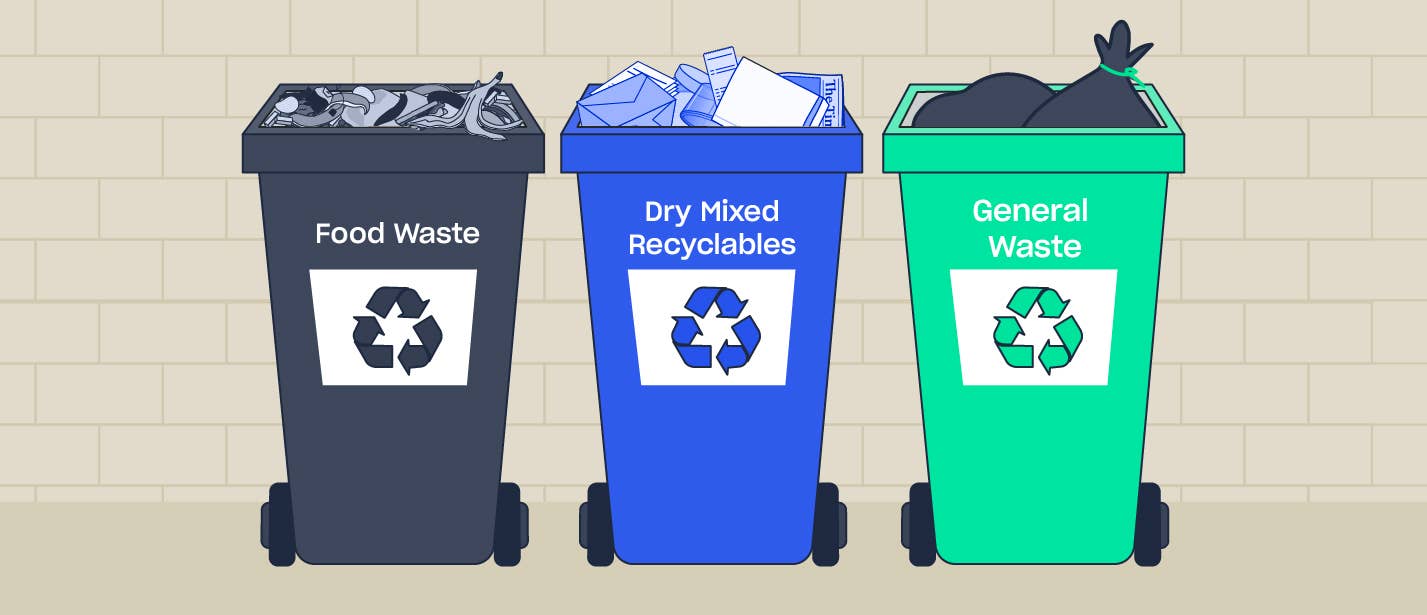
The act will impact many different types of businesses, however it is particularly relevant to the hospitality and food service sector. Guardians of Grub, WRAP’s food waste reduction campaign that focuses on the hospitality sector, states that 1.1 million tonnes of food is thrown away every year across the sector. As such, improving recycling in the hospitality industry is vital. By introducing mandatory food waste separation, the act seeks to reduce the negative impact of the tonnes of food waste generated by industries such as the hospitality sector.
Separating food waste and stopping biodegradable waste from being sent to landfills, enables it to be repurposed and reused. The government’s preference is for food waste to be collected for treatment by anaerobic digestion as this generates bio-fuel and digestate which can be spread to land, ensuring nutrients are recycled.
Under the act, businesses must have separate bins for the collection and storage of:
- Dry recyclable waste (glass, metal, plastic, paper and cardboard)
- Food waste
- General waste
How to Prepare for the Food Waste Separation Legislation
All businesses will eventually have to comply with the new legislation. As such, irrespective of whether it will impact your business in March 2025 or March 2027, it is important to prepare your business and staff for the new legislation.
Following the steps below will help you to prepare your business for the introduction of food waste separation legislation.
- Undertake a waste audit.
A waste audit is a review of the different types of waste that your business produces. It will help you to understand the type of waste that you generate, enabling you to see where, if possible, reductions in waste can be made. The information that you gather during a waste audit will help you to better plan waste handling, storage and disposal. The government has provided guidance on how to conduct a waste audit in a hospitality business and guidance for conducting an audit in other sectors can be found elsewhere on their website.
- Find a waste collector.
Now that you have an understanding of the type and quantity of waste that your business produces, you need to find a suitable waste collection service. The waste collector can be a private company or your local authority may provide the necessary services. Whilst cost is a notable factor when selecting a waste carrier, compliance should be a top priority and it is important to remember that if the company you use to dispose of your waste does so illegally, such as fly-tipping, you could be held responsible. You can visit the Public Register of Waste Carriers, Brokers and Dealers to check if your prospective waste collector is registered. Working with an accredited and compliant waste collection service that is aware of and complies with the new legislation, will ensure you avoid fines, enforcement actions and potential prosecution.
- Set up appropriate recycling bins.
You may already have different recycling bins in place, however the information gleaned from your audit will help you to assess whether they are still suitable for your business under the new legislation. Do you have enough bins for food waste separation or do you need to invest in new ones? Are your bins different colours to make it clear what type of waste should go in each bin? If not, is there clear signage to avoid cross contamination? It is also important to consider the size and location of your bins. If you are a larger business you may need a commercial 1100L wheelie bin or a smaller 240L bin, the same size as those outside your house, may be just fine. If you don’t already have the appropriate recycling bins set up then it is vital that you do so before the new legislation comes into force to avoid delays and potential fines.
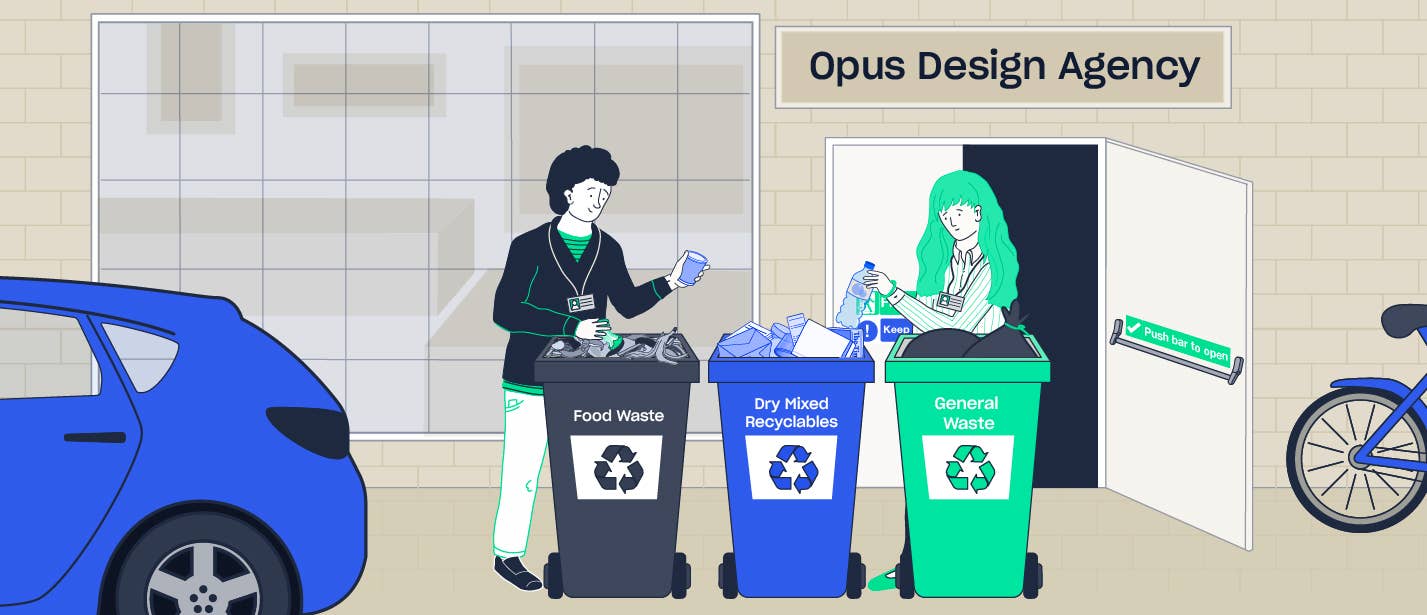
- Improve signage around your business.
Clear signage will enable your staff and anyone else who may be at your premises, to dispose of waste correctly. Imagery showing what waste needs to go in what bin, empowers people to confidently and correctly dispose of their waste. Posters are a good visual reminder of the correct process for waste disposal and help to reduce any ambiguity that people may have. Take the time to improve signage before the legislation comes into force so that people have time to get into the habit of disposing waste correctly. You can find a free downloadable poster that you can use in your own business below.
- Monitor and review your waste management and collection.
The government has introduced mandatory digital waste tracking that will come into force from April 2026. Mandatory tracking seeks to help businesses move towards a circular economy by providing a comprehensive way of tracking the amount and type of waste being produced and where it ends up. Continuous monitoring and reviewing of your current waste management and collection practices is good preparation for mandatory tracking and allows you to check that your practices remain compliant. It also enables you to establish the best approach for reporting, sharing and evaluating your practices before the enforcement of the new legislation. Remember, from April 2025 the general public and other parties will be able to report workplaces that do not comply with the new legislation. As such, monitoring and reviewing your waste management practices is vital to ensure you remain compliant and have the opportunity to correct any non-compliant practices before any reporting.
Free Waste Separation Posters
Our free downloadable poster is a simple and clear way to help you and your employees separate food waste effectively. Place the poster on or above the necessary bin, in a clearly visible spot so that people can easily see what waste needs to go where.
As mentioned, food waste is not the only waste that will need to be separated. Below you will also find posters to guide the separation of different types of waste. Download and print the posters that are relevant to your business and use them as clear visual tools to guide your staff.
- Food and drink cans recycling
- Food waste
- General waste
- Mixed recycling
- Paper and cardboard recycling
- Plastic tubs, bottles, pots, tubs and trays
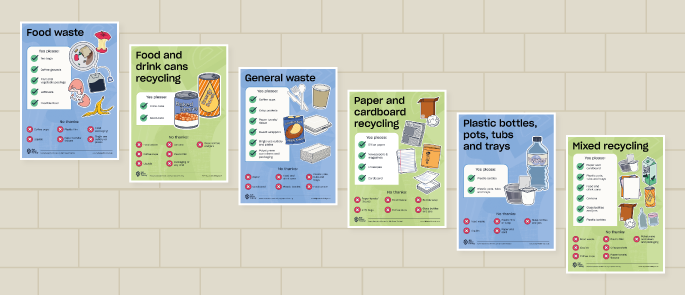
Food waste has an incredibly detrimental impact on the planet and whilst individual steps can be taken to reduce household food waste, the introduction of this new legislation reiterates the responsibility of businesses to reduce their negative impact on the environment. Whilst the new regulations have increased businesses responsibilities, its aim is to increase recycling rates and reduce the amount of waste sent for disposal which will, in the long run, help to reduce business costs, save energy, conserve natural resources and protect the environment.
Further Resources:
- How to Reduce Food Waste in Your Restaurant
- Recycling in the Hospitality Industry: How & Why Should We Do it?
- Environmental Awareness Training


